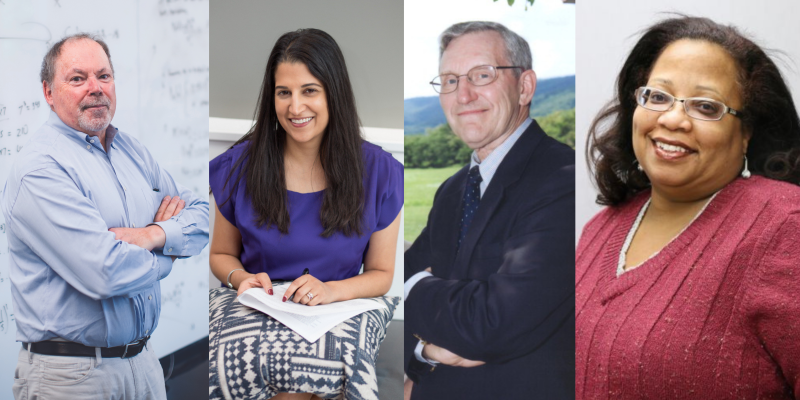Empowering Citizens To Be Their Own Health Researchers

To truly promote equity, everyday people — not just scientists — need to lead health research in their own communities, say experts from the School of Data Science and beyond.
What could a medical researcher possibly learn from the developer of the popular video game Candy Crush? That was the question Phil Bourne’s colleagues asked when he suggested bringing gamers to the National Institutes of Health.
But Bourne, who was the first associate director for data science at the NIH, wanted to explore how biomedicine might benefit from techniques used in the gaming industry. The workshop he organized not only pushed researchers to think about their field in a new way, it also inspired the NIH to put out a funding call that supported the development of new algorithms in the biosciences.
The moral of the story? “Good ideas can come from anywhere,” said Bourne, who now serves as dean for the University of Virginia’s School of Data Science. It’s a belief that underlies a new paper, published in the Journal of the American Medical Informatics Association, which Bourne wrote with a team of co-authors from UVA and beyond.
The paper calls for the use of citizen science — or public engagement in the scientific process — as a way of promoting health equity.
Motivated by the pandemic, the authors wanted to help scientists and laypeople work together, not only to tackle the health discrepancies that COVID-19 has made painfully clear, but also to take on a persistent failure to respond to them.
“We are seeing a significant underperformance of our healthcare system,” said Don Detmer, a UVA professor of public health and another of the paper’s authors. “There has been a historic tendency to neglect seeking the advice of all communities, which means that their unique perspectives on their area’s health problems often aren’t part of the overall picture.”
The wildly varying rates of COVID-19 immunizations in the U.S., he noted, are a prime example of why the absence of such perspectives is a problem. “When we lack all relevant information, our interventions are haphazard,” he explained. “We believe we can do better if we engage citizens as informed groups.”
Part of the issue, the authors argue, has been the prevalence of what’s known as precision medicine. Championed by President Barack Obama in 2015, precision medicine uses information about a person’s genes, environment and lifestyle to create treatments tailored to that individual.
The approach can be valuable. But it keeps researchers and clinicians myopically focused on an individual person, rather than a larger population or community. For example, instead of simply asking how a patient’s reliance on public transportation might impact her treatment, the authors say, health professionals need to consider how the transportation system itself might be redesigned to make sure patients can access all treatment options.
The authors propose bringing citizen science and data science together to encourage that shift. At the moment, Bourne said, the role patients play in the collection of medical data tends to be very passive.
“People give their data, and at the end of that process, they get something back in the form of a dashboard or some other indicator that says, ‘Okay, here’s where your health stands relative to a particular norm,’” he said. “Not to say that’s not useful, but people have no understanding of what happens in the middle.”
Whether they’re receiving medical treatment or participating in a study, Valdez explained, citizens should be involved every step of the way — not only collecting their own data, but also helping formulate the research questions that will decide what type of data to collect, as well as how to analyze, interpret, and disseminate it.
“As a scientist, I might have a question that I'm interested in, but it may not be number 10 or number 20 or even number 50 on an individual or a community’s list of what needs to be addressed,” she said.
Using data-driven citizen science in a health context is a novel concept, but preliminary efforts have proved promising. For one recent study, researchers partnered with 12 young people from the Karuk Tribe in California to conduct a health survey in their community. The tribe used the study’s findings to guide the development of community gardens, secure a grant from the U.S. Department of Agriculture to improve food choices in local schools, and kickstart a range of other health-related initiatives.
In Charlottesville, Valdez has also seen promising results in a different sector: housing. She recently served as an advisor — along with another of the paper’s authors, Karen Waters-Wicks – on an initiative led by Charlottesville’s Public Housing Association of Residents to create a community review board called Residents for Respectful Research. Any research conducted in Charlottesville that involves public housing residents will be required to receive the board’s approval.
What excites Valdez most, she said, is the potential to bring trained scientists together with people who have a different kind of knowledge — their own lived experience. “We want to put those types of expertise on an equal footing and in dialogue with each other,” she said.
The authors see the paper as an important first step in that direction. At this stage, it’s hard to imagine how their vision will translate into practice — that will come with time and ongoing conversations, Valdez said. But the paper’s authors remain sure of one thing.
“To believe in this day and age that the ability to solve problems resides in one place is wrong,” said Bourne.
At first, it might seem laughable to invite gamers to the NIH or ask everyday people to help design health studies. But in fact, Bourne said, “the idea that anyone can participate in the scientific process in a meaningful way is something that we should absolutely be taking seriously.”